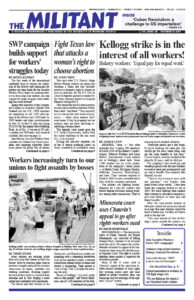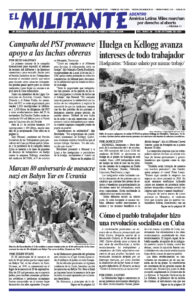MINNEAPOLIS — The due process rights of Derek Chauvin, the former Minneapolis cop convicted of killing George Floyd, continue to be trampled on by the courts. His request for a public defender to handle the appeal of his conviction has been denied by the Minnesota Supreme Court. The right to a public defender when needed is important for all working people.
Many of the 14 issues cited in Chauvin’s appeal of his conviction revolve around violations of basic rights that working people need and must defend to protect ourselves from cop frame-ups and the workings of the capitalist “justice” system.
The video of Floyd’s death after Chauvin brutally pinned him under his knee set off massive demonstrations across the U.S. and around the world. Posturing as “reformers” of the cops, the ruling class determined that Chauvin had to be convicted at all costs.
The former cop was sentenced to 22½ years in prison and says he cannot afford a lawyer to handle his appeal. In filings with the court, Chauvin says his debts outweigh his assets and his only income is prison wages. The police association that covered his earlier trial legal expenses is refusing to do so any longer.
Both the original trial judge and the state Supreme Court denied his request, saying he did not prove his “eligibility” for a public defender. Then a state Court of Appeals judge ruled Oct. 8 that without a lawyer Chauvin cannot present any oral arguments, making a mockery of his right to appeal.
“Government officials working on behalf of the capitalist ruling class generally organize to shield cops from criminal punishment for brutality against working people,” Doug Nelson, Socialist Workers Party candidate for mayor of Minneapolis, told the Militant. “With the trial of Chauvin, however, everything was organized to ensure a conviction on every charge with a maximum sentence. The rulers run roughshod over due process and constitutional protections when it serves their purpose. The request for a change of venue was rejected precisely because the charged atmosphere in Minneapolis would maximize pressure of all kinds on the jury.
“Our campaign demands the charging and prosecution of cops who brutalize workers. We need to organize the broadest possible demonstrations to achieve this,” Nelson said. “But the ‘justice’ system under capitalism will always be arrayed against working people. We must vigilantly guard the rights workers have won that protect us from the capitalist state, its courts and other anti-working-class institutions. No matter how horrible the crime or disliked the defendant, we must not let the rulers use trials such as these to undermine the rights we have won and that we need.”
Chauvin’s appeal challenges the judge’s refusal to grant a change of venue or more time for the defense to prepare. It also challenges his refusal to sequester the jury during the trial.
The trial itself was organized as a televised spectacle reinforced by a lynch-mob atmosphere that undermined the presumption of innocence. The downtown building where it took place was surrounded by fencing, razor wire and military vehicles. For months beforehand working people were subject to looting, arson and wanton destruction of property in their neighborhoods after anarchists and other anti-working-class forces, including leaders of Black Lives Matter, hijacked initial protests.
Each day jurors were picked up by sheriff’s deputies in secret locations, driven through city streets lined with boarded-up businesses, taken through the fortifications at the government center, where they were greeted by armed National Guardsmen, before being ushered into the courtroom. Before jurors reached their verdict, President Joseph Biden urged them to convict Chauvin.
While Chauvin had only one lawyer, the prosecution, organized by Minnesota Attorney General Keith Ellison, had a phalanx of high-powered attorneys to prepare and argue the case.
Working people have a stake in the outcome of the challenge to these attacks on constitutional rights.

